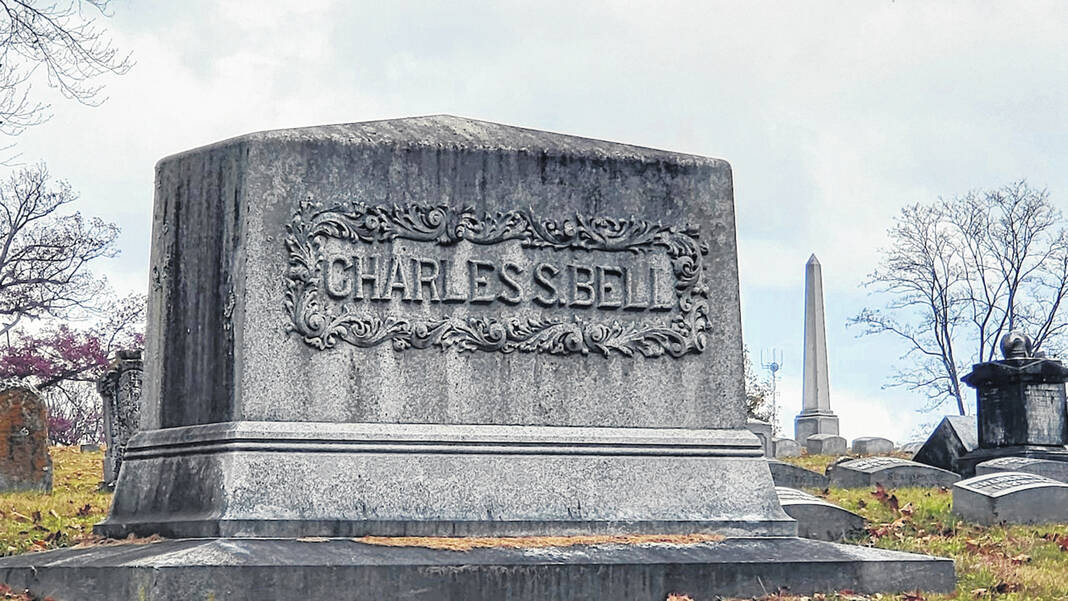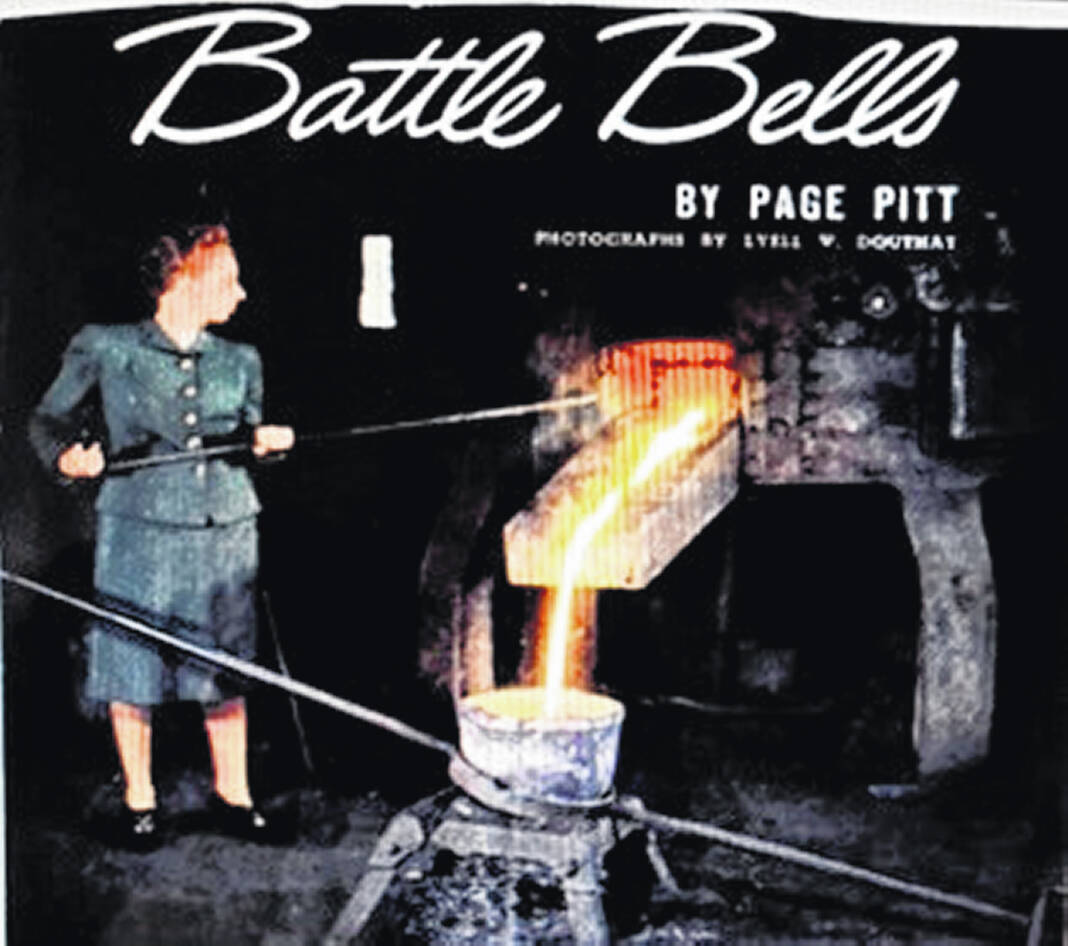
The headstone of C.S. Bell, who was born in Cumberland, Maryland but lived and worked in Hillsboro as one of its most historically illustrious citizens, is pictured in Hillsboro Cemetery as it appeared last month.
Juliane Cartaino | For The Times-Gazette

Virginia Bell, granddaughter of C.S. Bell, appeared in publications of the era as she helmed the company during the World War II era, during which it supplied bells and other materials for war ships of the all three major Allied Forces Naval fleets.
Courtesy photo
Though he died in 1905, the legacy of Charles Singleton Bell and the company that he founded in Hillsboro in 1858, continues to have reverberations throughout the town and beyond.
From the eponymous Bell’s Opera House, of which Bell was a noted benefactor, to the Festival of the Bells, the name C.S. Bell is inextricably woven into the historical lore of the region.
While modern residents might be aware of Bell’s name and the bells the company produced in Hillsboro, time may have eroded knowledge that Bell’s contributions to the town extended to many civic endeavors, including establishing a library and serving on the local school board and city council. His business ventures included being the vice president of a Hillsboro bank and officer of a railroad in addition to his primary industry of manufacturing the bells that would become well known throughout the world.
The website towerbells.org, an exhaustive source of information of not only C.S. Bell bells but of many others, acknowledged Bell’s many lifetime contributions to Hillsboro, and said, “Mr. Bell is still regarded as one of the town’s greatest benefactors.” The website delved further into detailed descriptions of some of the philanthropic activities in which Bell was engaged such as the establishment of The Hillsboro Reading Room, “which was located on the second floor of the Town Hall,” and was an earlier iteration of its later libraries.
Carl S. Zimmerman, who runs the website as the Webmaster and resident Campanolgist — someone who is an expert on the art of bell ringing — said that his interest in bells in general and specifically those having been produced by the C.S. Bell Company, “began with carillons and chimes …. made with traditional bells,” as well as, “tower chimes, great bells and bellfounding history.”
According to information provided by the Highland County Historical Society, upon Bell’s death, “more than 100 of his former employees marched with his casket as it was taken to the cemetery.”
The company Bell founded did not end with his death. Bell’s son, C.E. Bell, who Bell historian Tim Koehl described as, “a marketing whiz who created distribution channels with major catalog companies and established supply chains in the U.S. and South America,” brought increased worldwide relevance to the company. Marketing the steel alloy bells to a greater audience kept the brand and its products relevant.
By the 1930s, however, amidst the death of C.E. Bell, his son, “Chick” Bell, was chosen to run the company. As the third generation male heir, Koehl said “Chick” was struggling to maintain the company in the wake of the deaths of his father and grandfather.
Meanwhile, his sister, Virginia, went off to New York City to advance her career as an actress. But the need to help out with the family company superseded her personal artistic goals.
Virginia gave up her life in New York City to return to Hillsboro in order to help run the company in the absence of her antecedents, and she was the one that resurrected the faltering company.
“Times were tough when Virginia took the helm,” said Koehl.
In addition to her brother being reportedly disinterested in the responsibilities of the daunting legacy and the company’s resultant decline, the steel alloy bells for which the company was known were by then beseeched by competition from more expediently produced, lower quality items from rival companies.
“The company’s principal products, made of heavy cast iron, were quickly being replaced by lighter composite metal products,” said Koehl, explaining that, “Bells were being replaced by sirens and other electrically operated alarm systems at astonishing rates.
For a time, according to Zimmerman, “Sales of the bells slowed so the company again concentrated on labor saving farm machinery.” During this challenging time, Koehl said Virginia emphasized new grinding and milling technologies, but they were not enough for floundering foundries whose wares were confronted with competition by new technology and cheaper materials.
Virginia’s intuitive business sense and determination, combined with the influence of world events, dramatically turned the ship around.
Virginia ran the company, “as if she had an MBA level of business understanding,” Koehl said. “The first thing she did was spend time on the floor to learn what she could of the job of each individual.” In that way, she emphasized the importance of each person who contributed to the overall success of the organization. “That’s the way she saw people, as respected individuals and critical to success.”
The C.S. Bell Company’s successes took a timely turn when World War II invoked a shortage of brass and copper.
Virginia, upon learning that the Bureau of Ships was looking for a metal substitute, took action immediately, according to Zimmerman.
“Virginia Bell took one of her grandfather’s alloy bells to Washington, D.C. and personally obtained a contract,” he said.
As a result of Virginia’s actions, “The C.S. Bell Company manufactured all ship’s bells for the United States, Great Britain, and their allies during the war,” Zimmerman said.
Koehl described the process by which Virginia researched metallurgical demands and deftly executed a proposal to supply the bells for the war.
“As war drums sounded in Europe, the metals markets were highly regulated. Brass and bronze were in great demand as they were desperately needed for munitions. Virginia did the research and estimated the future demand of ships to be built for the war effort and the requirements necessary for bells on those ships,” Koehl said. “They then determined the company could supply iron bells. They put together a proposal and Virginia presented it to the United States Naval Command Procurement Office. She made her case.” The U.S. Navy then disseminated that information to its counterparts in Great Britain and Russia.
Koehl explained that, “as a result of that effort, the C.S. Bell Company won the contract to supply all the bells for all the ships in the three major Allied Naval Forces.”
The awarding of the contract, under the auspices of Virginia Bell, revitalized the company and gave great honor, pride and distinction to its employees.
The company that C.S. Bell had founded with a payroll of $7 a week had, under the organizational tutelage of his granddaughter, manufactured bells and landing craft parts for ships that landed on the shores of Normandy on D-Day.
For its efforts, the company received a telegram from Rear Admiral E.L. Cochran of the U.S. Navy that was subsequently published in a local newspaper under the heading, “Bell plant commended by Navy on D-day for its production of landing craft parts.” It said that, “Men and women employees of the C.S. Bell Company” were to be commended for their expedient production of parts essential to the war efforts, and indicated that, “The Bell Company has an unusual record as it is the only plant in the Cincinnati area which has not had a work stoppage or strike and at all times has been ahead of its production quota,” in supplying the necessary materials in a timely fashion to the military.
The telegram received by the company read as follows: “Your excellent performance of duty in producing material and components for the landing craft program has made it possible for the building yards to exceed the quotas of landing craft set by the combined chiefs of staff for completion. These landing crafts will play a vital role in the success of the offensive operations of The United Nations during the critical summer… On behalf of the secretary of The Navy, The Bureau of Ships desires to pass on to all those concerned the message, ‘well and smartly done.’”
The renewed success of the C.S. Bell Company became not only a story of family legacy and redemption of local corporate commitment, but a part of the world, and an enduring testament to innovation, adaptation when confronted with adversity and challenges invoked by changing times and technology, and the importance of organizations working collaboratively toward common goals.
Juliane Cartaino is a stringer for The Times-Gazette.

